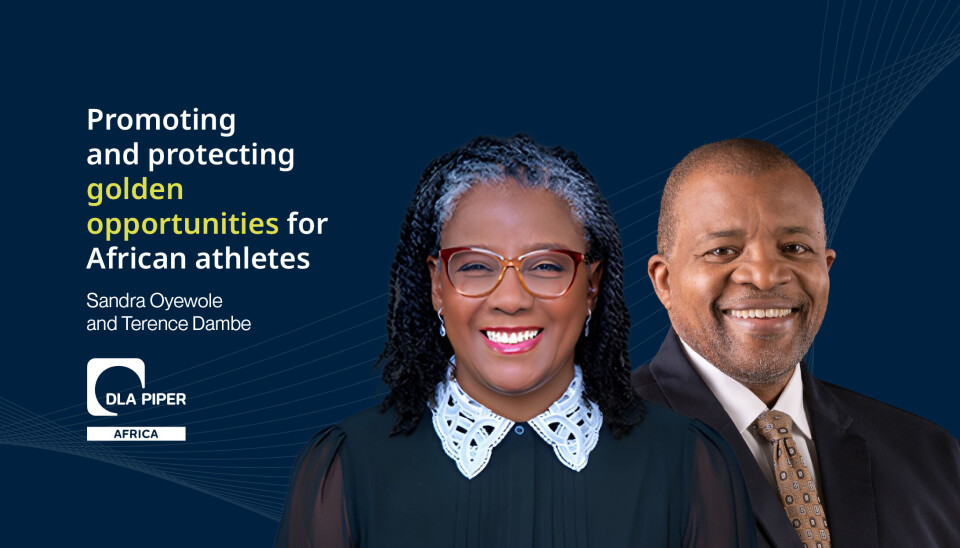Copyright : Re-publication of this article is authorised only in the following circumstances; the writer and Africa Legal are both recognised as the author and the website address www.africa-legal.com and original article link are back linked. Re-publication without both must be preauthorised by contacting editor@africa-legal.com
Promoting and protecting golden opportunities for African athletes

African sport is set to boom over the next decade, helping drive economic growth and social change. Sandra Oyewole and Terence Dambe discuss the importance of bridging the knowledge gap to help harness African sports potential.
The massive value of a vibrant African sports sector, both economically and socially, must not be underestimated, and governments need to step up to help support and grow the sector in various ways, say Sandra Oyewole and Terence Dambe of DLA Piper Africa.
“In a world where there’s a lot of disagreement, sports is one of those areas that can bring a country together,” says Oyewole, a media, sports, and entertainment (MSE) expert and partner at Olajide Oyewole LLP, the Nigerian member firm of DLA Piper Africa. “But much more needs to be done to contribute to the welfare of athletes and in respect of the growth and sustainability of proper structures in sports.”
Beyond the inspirational aspect of seeing Olympic 200m champion Letsile Tebogo winning Botswana’s first-ever gold medal, or Mohammed Salah and Victor Osmihen star at the highest levels of world football - championing the Africa narrative on the world stage - the economic value of African sports is set to skyrocket.
Forbes reports it will nearly double to more than $20 billion by 2035, and it can be a significant driver of economic growth and social change. DLA Piper Africa is helping to harness and grow that potential by their work with African athletes and sporting organisations.
“A few months before last year’s Olympics, we began our engagement with talented sprint sensation Letsile Tebogo on the possibilities of creating a partnership,” says Dambe, Managing Partner of DLA Piper Africa, Botswana (Minchin & Kelly). ““It was important to us to ensure Letsile's interests were protected, as a young athlete. As a brand, we're passionate about helping people and businesses on the continent to succeed locally, regionally, and on the global stage. We wanted to help Letsile to get the necessary assistance from a legal perspective, whatever his Olympic results.”
To assist Tebogo, who was rapidly growing from local to global star, Dambe brought in Oyewole for her great MSE expertise, along with regional and international DLA Piper colleagues. As his official legal partner, DLA Piper Africa helps Tebogo safeguard his interests, providing legal services locally in Botswana, across Africa, and globally.
“It is important that African athletes have professionals to guide them during the course of their career, not only when they’re at the top of the game,” says Oyewole. “We want a situation where you have a sustainable career, that you’re successful financially, and don’t end up living in penury when you’re no longer winning medals or championships. We’ve seen what can happen when athletes don’t plan for their future, so we also give advice on tax, property, and bring in other departments and practice within the firm to help.”
More broadly than helping individual athletes, however, Oyewole and Dambe believe lawyers have a role to play assisting sporting associations and regulatory bodies, and encouraging African governments to provide vital infrastructure, knowledge, and communication.
“Sporting structures in Africa are not as well developed as the global north, and many youngsters won’t know their value, or how to deal with their potential career,” says Dambe. “It’s very important to have structures in place, because not everyone has access to resources such as DLA Piper, and if a youngster shows potential, they need guidance about the business of sport.”
Governments across Africa, with the help of the private sector, need to go beyond building venues or training facilities, says Oyewole, and put in place programmes that educate young athletes on the formalities of business and where they can go to get help from professional advisors. “Governments should create enabling environments that allow for talent development, both on and off the field. It’s a whole ecosystem that we’re talking about.”
